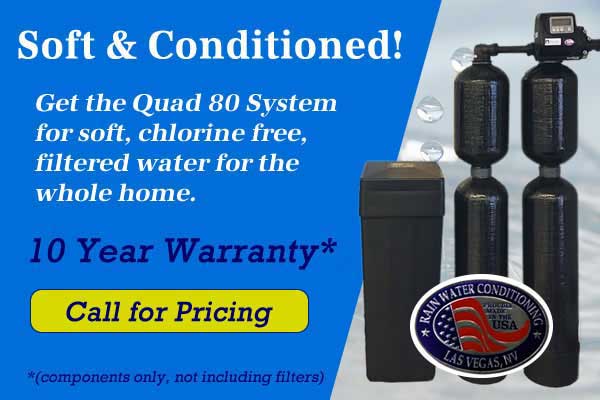
If you happen to live somewhere with hard water, you know the damage it can do to your water fixtures, glassware, pipes, laundry, and even your skin and hair! Water softeners are designed to remove calcium, magnesium, and other minerals that make water hard, so you have purified, soft water at every tap in your home or business. However, what size water softener do you need?
Here’s everything you need to know about choosing a water softening system from our team of Las Vegas water softener experts:
How Do I Know I Need a Water Softener?
First of all, it’s essential to determine whether you need a water softener or not. In Las Vegas and throughout Southern Nevada, the majority of our water supply comes from Lake Mead. As the water makes its way across several states and climates via the Colorado River, it picks up sediment and minerals that make the water particularly hard.
You’ll notice your water is hard in several ways, including:
- Crusty, white buildup on your faucets and sinks
- Cloudy or spotty dishes
- Dingy and stiff laundry
- Having to use more soap than normal for cleaning
- Dry hair and skin
- Chalky film on your appliances that use water
If you’re experiencing any of the signs of hard water, you’ll definitely benefit from a water softening system. In Las Vegas, there are several sizes of water softeners that will help you avoid the damaging effects of hard water.

Measuring Your Water Hardness
One of the things to consider when choosing which water softener will work best for you is your water’s hardness. You’ll need to enter the hardness value after setting up your water softener for optimal performance, and guessing this number will result in your system not working as it should. If your water comes from the city water supply, you can generally get this number from your local water utility company.
According to the Las Vegas Valley Water District, the water hardness in Las Vegas measures at 278 parts per million or 16 grains per gallon¹. This level is categorized as “very hard” and can wreak havoc on your plumbing pipes and fixtures! Use this number to guide you when purchasing your water softening system.
Your Daily Volume of Water Consumption
The next thing to factor into your choice of water softeners is how much water you use in your home or business. Based on your daily water consumption, you’ll know which water softening system can handle the volume of water you need. You can use your latest water bill to get an accurate idea of your total water consumption over a period of time (usually per month). Then, just divide that by the number of days in the month to get your daily use.
However, keep in mind that it’s very likely you’ll use more water during the hot summer months than other times. Also, you may use more water if you have visitors or are filling your pool during a particular month. If that’s the case, you can use the average number of 75 gallons per day per person for a generally accurate estimate of your daily water usage.
Calculating Your Daily Water Softening Requirements
Here’s where you apply the numbers we’ve already discussed. Take your daily water usage and multiply that by your water hardness. This number is your daily water softening requirement.
To give you an idea of what we mean, here is an example. Let’s say you live in Las Vegas, so your water hardness is 16 grains per gallon. You also have four people in your household.
- Hardness: 16 grains/gallon
- Daily Water Usage: 4 people x 75 gallons/day = 300 gallons/day
- Daily Water Softening Requirement: 16 grains/gallon x 300 gallons/day = 4,800 grains/day
In this example, your water softener should be able to remove around 4,800 grains per day. This number is key to knowing which water softening system can handle your needs.
Understanding Water Softener Grain Capacity
The next step is to choose a water softening system that will match your conditions and the volume of water your family uses on a daily basis. Based on the example above, it may seem like any water softener could handle your needs.
However, keep in mind that water softeners typically regenerate once per week. This means you’ll need to take that “per day” number and multiply it by seven to match your grain capacity to the displayed numbers at the store. With our 4,800 grains/day, you’ll need a water softener that has a grain capacity of at least 33,600 (4,800 x 7).
Also, keep in mind that your water usage will fluctuate and change depending on how many people live on the property and the time of year. You may want to consider this when purchasing a water softener with a lower grain capacity.
Purchasing Your Water Softening System
When it comes time to invest in a water softener, not all retailers are created equal. A lot goes into calculating what size water softener you’ll need, so you want to work with trusted experts who understand these numbers. Whether you’ve done the calculations yourself or still need to figure out which system is best for you, the team at Rain Water of Las Vegas is ready to help!
At Rain Water Conditioning, we have a wide variety of water softeners, water conditioning systems, and water purifiers that will give you the highest-quality water in your home or office. To learn more about our water softeners, water softening installation, and other services, contact our office today!
Sources:
¹Las Vegas Valley Water District (LVVWD). Facts about our water. Retrieved 21 June 2021 from https://www.lvvwd.com/water-quality/facts/index.html
